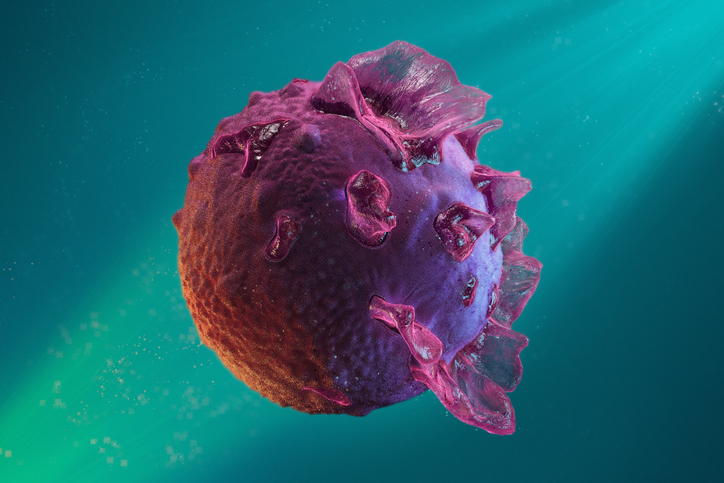Researchers at the Wistar Institute and their collaborators say they have discovered a potential target for gastric cancers associated with Epstein-Barr Virus. The study “Decitabine disrupts EBV genomic epiallele DNA methylation patterns around CTCF binding sites to increase chromatin accessibility and lytic transcription in gastric cancer” appears in mBio.
“Epstein-Barr virus (EBV) is associated with 10% of human gastric carcinomas, which are distinguished by a CpG island methylator phenotype. In gastric carcinoma tumors and cell lines, the EBV genome also exhibits a high degree of 5-methyl cytosine (5mC) marks, which are propagated by host DNA methyltransferases (DNMT) with each cell cycle,” wrote the investigators.
“We sought to determine the effect of DNMT inhibition by the small molecule Decitabine (DCB) on EBV genomic 5mC and chromatin structure in two tumor-derived gastric cancer cell lines, YCCEL1 and SNU719. Decitabine effects on EBV genomic 5mC, chromatin structure, and viral gene expression were profiled by reduced representation bisulfite sequencing, ATAC-seq, and RNA-seq, respectively.
“Decitabine treatment resulted in global viral genome hypomethylation and a global increase in open chromatin. The most striking finding resulted from analyzing the methylation pattern from single RRBS sequencing reads, showing that the EBV genome contains a heterogeneous pool of epigenetic states, each of which is eroded upon Decitabine treatment. We observed heterogeneous 5mC epiallele patterns around EBV genomic CTCF binding sites and lytic gene transcriptional start sites.
“These results highlight the importance of 5mC in maintaining EBV genomic chromatin structure and latency. Furthermore, the presence of 5mC epialleles suggests EBV+ gastric cancers harbor transcriptionally distinct EBV episomes, which may exert distinct functional roles in maintaining latency and driving tumorigenesis.”
Focus on the epigenetic characteristics
The lab of Italo Tempera, PhD, associate professor in the gene expression & regulation program in the Ellen and Ronald Caplan Cancer Center, at The Wistar Institute, investigates the epigenetic characteristics of gastric cancer associated with the Epstein-Barr Virus: EBVaGC. In evaluating EBVaGC’s epigenetics, the Tempera lab highlights a target that could advance as a future treatment for this type of cancer. The Tempera team, along with collaborators at the Coriell Institute for Medical Research and Brigham and Women’s Hospital of Harvard Medical School, demonstrated that an epigenetically active compound called decitabine disrupts the genome of EBVaGC by epigenetically modifying the cancer’s DNA, a finding that offers the potential for a new approach to treating EBVaGC.
“What we have identified is essentially a self-destruct button within this kind of cancer, and our paper shows that we figured out how to press that self-destruct button,” said Tempera. “Normally, a latent virus that reactivates and starts to kill cells is a bad thing. But by switching that viral lytic process back on in these cancer cells by using epigenetic signaling, we’re effectively getting the virus to kill the cancer cells that it’s responsible for in the first place.”

In EBVaGC, the cancer cells’ DNA is hypermethylated: the DNA contains a high percentage of cytosine with a 5-methyl group attached to it. As a silencer of gene expression, DNA methylation allows EBV to remain latent. This methylation pattern plays a significant role in regulating the EBV latency-lysis cycle within the cancer cells.
DNA methylation, as an epigenetic factor, usually functions as a gene-silencing mechanism, particularly in certain regions of the genome.
To disrupt this epigenetic profile, the researchers turned to decitabine, a compound known for its ability to reduce DNA methylation levels (i.e., to hypomethylate the DNA). Tempera and his co-authors treated two cell lines that were derived from EBVaGC tumors with decitabine. The cell lines that received the treatment demonstrated massive reductions in DNA methylation across the genome relative to the control as assessed by a variety of epigenetic assay techniques.
In observing the effects of decitabine treatment on EBVaGC, Tempera’s team found a significant disruption of the cancer’s epigenetic profile. The EBV genome within EBVaGC treated with decitabine resulted in widespread, mostly uniform hypomethylation of the EBVaGC epigenome (with a few regional exceptions). Tempera and colleagues discovered that the hypomethylating effect of decitabine treatment reactivated the lytic cycle of the latent EBV in the cancer cells. Because lysis is lethal to cells, the epigenetic reactivation of lysis within gastric cancer associated with EBV offers a promising potential treatment for the specific subset of EBVaGC.
“Now we know that we can use the epigenome of Epstein Barr Virus against the gastric cancer that it affects. That’s an exciting potential cancer therapy we have as a result of investigating the interplay between epigenetic patterns and disease lifecycle,” explained Tempera.


